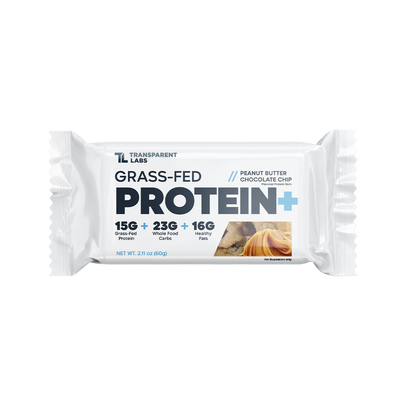How to Gain Weight with a Fast Metabolism in 2024 (Safely)

Having a fast metabolism can certainly have its benefits. However, without proper nutrition and a diligent workout routine, gaining weight can be incredibly challenging — not only to accomplish but to sustain.
Though eating a ton of unhealthy calories from junk food or processed meals may sound like a fool-proof plan, it’s not the type of healthy weight gain that will benefit us. Instead, focus on achieving healthy weight gain by consuming nutrient-dense and calorie-dense meals.
Follow along to find out how to gain weight with a fast metabolism (we'll be focusing mainly on increasing muscle mass).
How Your Metabolism Contributes to Weight Gain and Weight Loss
We all know a friend or family member who is naturally very lean/skinny despite eating a lot of junk food. Such individuals can thank their "fast" metabolism for allowing them to eat a considerable amount of calories without exceeding their energy expenditure.
While that may seem like more of a gift than a curse, finding ways to gain weight with a fast metabolism can be challenging. But before we jump into what a fast or high metabolism is exactly, let's briefly clarify what the terms "metabolism" and "metabolic rate" actually mean:
-
Metabolism broadly refers to the myriad biochemical processes that occur within cells to sustain life, primarily involving anabolism (reactions that consume energy to synthesize complex molecules) and catabolism (reactions that break down complex molecules to release energy) [1]. For example, metabolic pathways in cells are critical for converting nutrients into usable energy (e.g. adenosine triphosphate/ATP), which is then used to fuel physiological functions like muscle contraction, protein synthesis, and neural communication.
-
Metabolic Rate is essentially a quantitative summation of the energy expended from metabolic processes. A person's metabolic rate is often quantified by their resting/basal metabolic rate (RMR/BMR), which is an estimation of the energy (calories) they expend per day simply to exist. In other words, your BMR is the amount of calories your body would burn per day if you were to do nothing but lay in bed.
Intuitively, metabolic rate directly impacts energy expenditure and, consequently, body weight regulation.
Slow vs. Fast Metabolism
A person who has a "low" or “slow" metabolism requires fewer calories to maintain an energy equilibrium—where the calories they expend are matched with the calories they ingest. Oftentimes, people with a slower metabolic rate need to be more mindful regarding the number of calories they consume in a day, as they will gain weight fast if they're not careful. A slow metabolism — along with several other factors — can make it difficult for people to lose weight.
On the other hand, someone with a "high" or “fast" metabolism requires more calories to function and is able to lose weight more readily since the body expends energy quicker than it’s being consumed. One of the major downfalls to having a fast metabolism is that you’re more likely to have trouble gaining weight [2]. While it may be tempting to seek quick fixes, focusing on sustainable weight gain goals is crucial for long-term health and fitness.
5 Tips for Healthy Weight Gain with a Fast Metabolism
The faster the metabolism, the harder it can be to gain healthy weight, especially lean muscle mass. Fortunately, there are plenty of solutions that can help you push past this barrier and start gaining weight in a healthy, more sustainable way. It's also important to aim for slower monthly weight gain to ensure that the weight you gain is primarily muscle mass rather than body fat (more rapid weight gain isn't inherently "better").

With that in mind, here are five tips on how to gain weight with a fast metabolism:
1. Increase Your Daily Calorie Intake
It should come as no surprise that in order to gain weight, it’s essential to eat more calories throughout the day. Being in a calorie surplus, meaning that you eat more calories than you need or will expend, can help you reach your weight gain goal. By focusing on nutrient-dense foods, you can ensure that your weight gain is both healthy and sustainable.
So, how many calories do you need to eat in order to gain weight? You can find out your calorie needs by using a calorie calculator. The goal for weight gain is to aim to consume 500-1,000 more calories than you burn. Though these calculators are helpful to start, you’ll only need to count calories in the beginning. Eventually, you’ll begin to familiarize yourself with a meal routine for healthy weight gain.
Benefits of Increasing Protein Intake to Gain Weight
Protein is an essential macronutrient that can help build muscle mass and contribute to optimal weight gain — especially when combined with a high-volume resistance training program.
According to the Recommended Dietary Allowance for protein, adults should consume between 1.0 to 1.6 grams of protein per kilogram of body weight every day in order to promote muscle growth and strength gains [3, 4].
Some of the best high-protein options include:
-
Meats
-
Fish
-
Eggs
-
Steel cut oats
-
Cottage cheese
-
Greek yogurt
-
Beans and legumes
-
Nuts (i.e pistachios, almonds, walnuts, etc.)
If you’re struggling to get extra calories from protein, supplements like whey protein can be beneficial for weight gain.
Eat More Carbs and Fats for Weight Gain
Carbohydrates and fats are two other necessary macronutrients that can be optimized for gaining weight.
Compared to carbs and proteins which both provide 4 calories per gram, fats provide us with 9 calories per gram. For this reason, consuming more healthy fats (i.e. unsaturated fats) can help supply the body with more calories per meal [5].
Though carbohydrates are certainly beneficial, it’s more important to consume fats and protein first to ensure you’re getting enough calories to gain weight before filling up on carbs. For example, start with more calorie-dense options such as meat and sliced avocado before moving on to high-fiber foods such as raw vegetables.
Here are some of the best healthy fat sources that help you gain weight:
-
Fatty fish
-
Eggs
-
Dairy products
-
Nuts and seeds
-
Olive oil
-
Avocado
-
Dark chocolate
2. Eat More ‘Energy-Dense’ Foods
Not all foods are made the same. For example, processed junk foods give you plenty of calories but little-to-no nutritional value. Unlike healthy foods, they’re packed with sugar, salt, and saturated fats that are more likely to contribute to fat gain.
Nutrient-dense foods are filled with protein, healthy fat, complex carbs, vitamins, and minerals that contribute to a well-balanced diet. The problem is, most of these foods are more filling and make it challenging to get in enough calories to support weight gain.
Some of the best calorie-dense foods that can help you gain weight include:
-
Dried fruits
-
Nuts (e.g. almonds, macadamia nuts, walnuts, etc.)
-
Full-fat dairy (e.g. whole milk, whole-milk yogurt, aged cheese, etc.)
-
Whole grains (e.g. brown rice, rolled oats, etc.)
-
Fats and oils
-
Fattier meats
-
Sweet potatoes
-
Peanut butter
-
Trail mix
3. Engage in High-Volume Resistance Training
When you’re looking to gain weight healthily, eating a surplus of calorie-dense foods can only go so far. Exercise can help ensure that our excess calories are being used for lean muscle growth rather than being stored away in fat cells.
High-volume resistance training is essential for muscle hypertrophy and increasing body mass. The ideal training volume for building muscle mass is 6-12 reps, 3-4 sets, and heavy weights with optimal form (6).
Combining protein supplementation with resistance training has been proven to promote additional muscle mass gains beyond that of strength training alone. Research has found that during 6 weeks of resistance training, participants who were supplementing with protein increased their lean muscle growth by 27% (7).
It’s also important to note that for maximal increases in lean muscle mass, it’s recommended to avoid cardio exercises since it expends more calories and may cause you to lose weight (8).
4. Eat Smaller Meals Throughout the Day
With a fast metabolism, you continue to burn calories more efficiently throughout the day. To ensure your body remains in a calorie surplus, it’s important to eat plenty of food all day long. The problem is, we tend to become fuller faster with large meals – especially if you’re underweight.
For this reason, it’s advantageous to spread your calorie intake out with various small, nutrient-dense meals. Rather than eating 2-3 large portion sizes, eating more frequent meals and snacks 5-6 times a day can help you add a few pounds to the scale.
5. Focus on Making Meals More Enjoyable
A common complaint we hear from people who consume more calories for weight gain is that eating tends to feel like a chore. To help you achieve your bodyweight goals, it’s important to create meals that are both fun and delicious.

The good news is that the tastiest ingredients can often have the most calories! Sauces, dips, herbs, and spices are all helpful ingredients to boost flavor and nutritional value. Add some nutritional yeast, cheese, and seasoning salt to your baked broccoli, or sprinkle some cinnamon and hemp hearts on your peanut butter toast. Not only do these ingredients make your meal more enjoyable, but they can also help you gain muscle mass!
Monitoring Your Weight-Gain Progress
Monitoring progress is a critical component of any fitness regimen, especially when the primary goal is to increase muscle mass. Implementing progress-tracking methods will give you insights into how your dietary and exercise strategies are working; these insights will allow you to adjust your approach in a timely manner if things don't seem to be trending in the right direction.
To track weight-gain progress effectively, follow these tips:
-
Weigh Yourself Daily to Calculate Weekly Body Weight Averages: Weighing oneself daily can provide valuable data on weight fluctuations. By recording these measurements and calculating a weekly average, it is possible to gain a more accurate picture of overall progress (Chung et al., 2019). This method helps to smooth out daily variances due to factors such as fluid retention.
-
Take Periodic Progress Photos: Taking regular progress photos can provide a visual representation of changes in body composition. Photos should be taken under consistent conditions, such as the same time of day and lighting, to accurately reflect physical changes over time.
-
Body Composition/Anthropometric Assessments (Optional): Utilizing anthropometric measurements, such as waist, hip, and arm circumferences, provides additional insight into how the body is changing in response to diet and exercise. These measurements can help distinguish between muscle gain and potential fat accumulation.
Periodic assessment of these metrics should guide adjustments to dietary and exercise strategies. If progress stalls, modifying caloric intake, macronutrient distribution, or exercise intensity may be necessary. For instance, increasing calorie intake and/or altering resistance training variables can help overcome weight-gain plateaus.
Key Takeaways
Despite prevalent beliefs, possessing a "fast" metabolism is often exaggerated as an insurmountable barrier to weight gain. The notion that certain individuals, particularly "hardgainers/ectomorphs," are destined to be underweight due to their genetic metabolism is a partial truth at best.
While metabolic rates do vary, the variation is not typically sufficient to prevent weight gain if a calorie surplus is maintained. Understanding that strategic dietary and physical activity modifications can effectively counterbalance metabolic tendencies is crucial for healthy weight gain.
If you need further guidance on strength training, check out our Push-Pull-Legs Training Routine. Remember, it takes time to gain weight—especially muscle mass—when you have a fast metabolism, so don't get discouraged if progress seems slow at times. Stay consistent, and the small steps will eventually lead to your bigger goals.









